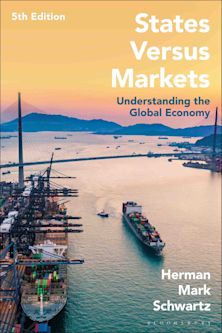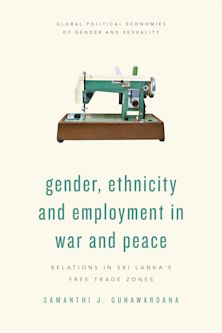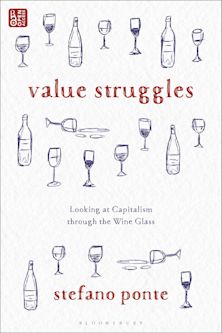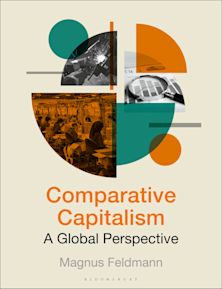- Home
- ACADEMIC
- Politics & International Relations
- Political Economy
- Revolution and State in Modern Mexico
Revolution and State in Modern Mexico
The Political Economy of Uneven Development
Revolution and State in Modern Mexico
The Political Economy of Uneven Development
You must sign in to add this item to your wishlist. Please sign in or create an account
Description
Now in an updated edition, this groundbreaking study develops a new approach to understanding the formation of the postrevolutionary state in Mexico. In a shift away from dominant interpretations, Adam David Morton considers the construction of the revolution and the modern Mexican state through a fresh analysis of the Mexican Revolution, the era of import substitution industrialization, and neoliberalism. Throughout, the author makes interdisciplinary links among geography, political economy, postcolonialism, and Latin American studies in order to provide a new framework for analyzing the development of state power in Mexico. He also explores key processes in the contestation of the modern state, specifically through studies of the role of intellectuals, democratization and democratic transition, and spaces of resistance. As Morton argues, all these themes can only be fully understood through the lens of uneven development in Latin America.
Centrally, the book shows how the history of modern state formation and uneven development in Mexico is best understood as a form of passive revolution, referring to the ongoing class strategies that have shaped relations between state and civil society. As such, Morton makes an important interdisciplinary contribution to debates on state formation relevant to Mexican studies, postcolonial and development studies, historical sociology, and international political economy by revitalizing the debate on the uneven and combined character of development in Mexico and throughout Latin America. In so doing, he convincingly contends that uneven development can once again become a tool for radical political economy analysis in and beyond the region.
A substantive new epilogue engages the main theoretical debates that have emerged since the book was first published, while also exploring the dominant geographies of power and resistance that are shaping state space in Mexico in the twenty-first century. And now a Spanish edition, Revolución y Estado en México moderno (México, D.F.: Siglo XXI, 2017), is available as well.
Click here to see the book trailer.
Table of Contents
Part I: Constructing Revolution and State in Modern Mexico
Chapter 2: Mexican Revolution, Primitive Accumulation, Passive Revolution
Chapter 3: Capital Accumulation, State Formation, and Import Substitution Industrialization
Chapter 4: Neoliberalism and Structural Change within the Global Political Economy of Uneven Development
Part II: Contesting Revolution and State in Modern Mexico
Chapter 5: Intellectuals and the State: A Critical Social Function or in the Shadow of the State?
Chapter 6: The Political Economy of Democratization and Democratic Transition
Chapter 7: Uneven Agrarian Development and the Resistance of the EZLN
Chapter 8: Conclusion: Permanent Passive Revolution?
Epilogue: Telescoping Passive Revolution
Bibliography
Product details
| Published | 04 Oct 2013 |
|---|---|
| Format | Ebook (PDF) |
| Edition | 1st |
| Extent | 346 |
| ISBN | 9798216212911 |
| Imprint | Rowman & Littlefield |
| Illustrations | 4 BW Illustrations, 7 BW Photos, 9 Tables |
| Series | Critical Currents in Latin American Perspective Series |
| Publisher | Bloomsbury Publishing |
About the contributors
Reviews
-
In Giuseppe di Lampedusa’s classic novel The Leopard, the character of the Sicilian nobleman during the Risorgimento observes, 'If we want things to stay as they are, things will have to change.' This insight of the fictional character on the cusp of major social change illustrates the Gramscian concept of passive revolution, which is at the core of Adam David Morton’s intellectually ambitious and stimulating work, Revolution and State in Modern Mexico. . . . [The book] makes several significant contributions to debates on Mexican historiography. . . . This bold application of historical sociology will be an important reference for understanding post-Revolutionary Mexico. The construct of passive revolution is also useful beyond the Mexican case to highlight the contradictions of 'post-neoliberalism' in twenty-first-century Latin America.
Richard Stahler-Sholk, Eastern Michigan University, Bulletin of Latin American Research
-
Adam Morton has produced a study that is nothing short of seminal. . . . Revolution and State in Modern Mexico combines theoretical sophistication and innovation with a thoroughgoing understanding of empirical complexities in an analysis that, when it comes time to construct a canon of Marxist historical sociology, will sit comfortably and appropriately among the classics whose insights it draws on and to whose legacy it contributes.
Alf Gunvald Nilsen, author of Adivasis and the State, Capital & Class
-
The work of Adam Morton in Revolution and State in Modern Mexico is of utmost importance. This is solid research, well documented and purposeful. These attributes make it a must reference for Gramscian studies, international relations, and the historical sociology of modernization in Mexico. The detail and rigor with which Morton addresses his subject matter is no less important. The result is the mobilization of a great deal of evidence to support his arguments.
Emilio Allier Montaño, Revista Mexicana de Ciencias Políticas y Sociales
-
Revolution and State in Modern Mexico constitutes perhaps the contribution on transitions to and experiences of capitalism in Mexico, and it will be of lasting significance beyond the empirical confines of the book—not least because of the growing interest in Latin American countries among IPE scholars.
Panel of judges, International Political Economy Group (IPEG) Book Prize of the British International Studies Association
-
This is a work of remarkable erudition in which Adam Morton brings fresh perspectives to our understanding of the Mexican Revolution and its aftermath, employing Antonio Gramsci’s concept of 'passive revolution' to explain how and why dependent capitalist development and neoliberalism took the form they did in Mexico. In a sweeping interdisciplinary survey, Morton draws on interviews with economic elites, politicians, state functionaries, and public intellectuals. Above all, he engages with theorists who consider not only state formation but also the roles of popular culture, literature, and spatial relations as expressed in architecture, city planning, and public art. As telling examples, Morton provides a study of the 'social function' of the novelist Carlos Fuentes as a 'mixture of critical opposition and accommodation' to passive revolution and of the Zapatistas as a counter-space of resistance—however imperfect—to passive revolution. Along with much else in this audacious book, these two studies give readers stimulating material with which to agree and disagree.
Judith Adler Hellman, author of The World of Mexican Migrants
-
Adam Morton has produced an exceptional work in radical historicism on postrevolutionary Mexico and a virtuoso’s exposition of Antonio Gramsci’s theory of hegemony, passive revolution, and uneven development. His ambitious and successful undertaking delivers a highly nuanced understanding of postrevolutionary Mexican history intertwined with an analysis of the passive revolution of capital on a world scale. Weaving theory and history throughout, Morton engages a wide range of scholarly debates about the state, postcolonialism, democratization, and resistance. This book will be a must-read in the fields of Mexican and Latin American studies and provides a provocative and contrasting interpretation to mainstream 'transition studies' in political science. It converses with and provides a welcome contribution to the most prominent strands in historical sociology—the sociology of power, international political economy, and geography.
Gerardo Otero, Simon Fraser University, author of Farewell to the Peasantry



































